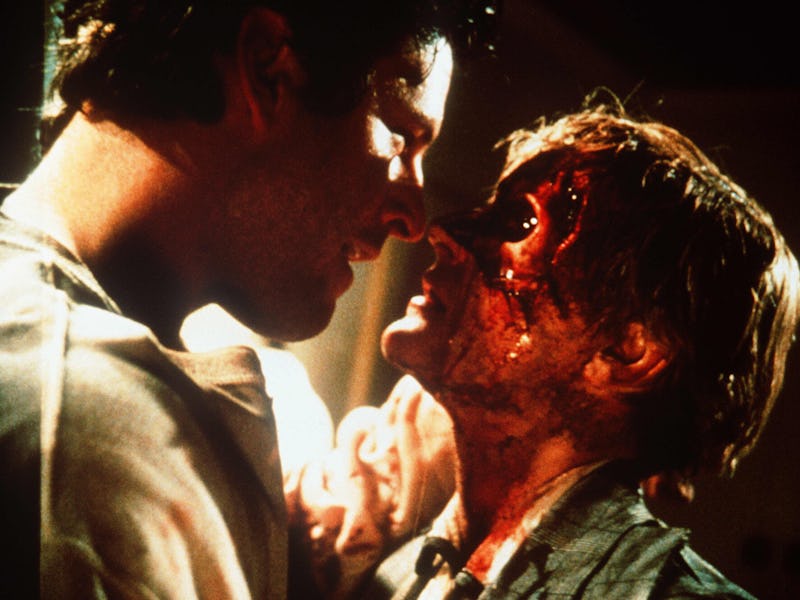Stephen King’s Bleakest Film Starred Two Sci-Fi Legends — But You Forgot They Were In It
There’s a lot to say about Pet Sematary. But the actual cast was a big deal. At least, at the time.

For horror fans, the 1989 film version of Stephen King’s Pet Sematary represents a kind of platonic ideal of supernatural ‘80s horror. Like the best of King, Pet Sematary is both subtle and gonzo, with real themes of grief, crisscrossing with scary undead children, undead cats, and a couple of parents who really tried to do the right thing, but messed with dark powers that they couldn’t possibly understand.
But, for sci-fi diehards of the 1990s, Pet Sematary is more than just a great King novel translated to the screen. It’s also a film that stars two very important sci-fi actors whose performances — and their respective legacies — are slightly undervalued.
As in the 1983 novel, Pet Sematary, directed by Mary Lambert with a screenplay by Stephen King himself, is mostly focused on a dad named Louis (Dale Midkiff) who reanimates a dead cat, and then, his slain son, Gage (Miko Hughes). He does this by using ancient Miꞌkmaq burial ground that brings people back to life, albeit, changed. Louis and his wife Rachel (Denise Crosby) are also both haunted by different spirits, each intent on teaching them a lesson, or generally freaking them out. By the end, everyone’s life is ruined, Rachel dies, and Louis tries to bring her back to life, hoping that she won’t come back homicidal like everyone else.
The movie ends with one of the greatest cut-to-black moments in any horror movie, but everything that leads up to that moment is creepily memorable. From the terrifying reborn cat Church to Stephen King’s slightly cheeky cameo as a priest at a funeral, Pet Sematary certainly works better than the somewhat muted 2019 remake.
Denise Crosby had to face an oil-slick monster in Star Trek. This is nothing.
But, what gets lost in the mix here is the two stars. Before starring in Pet Sematary in 1989, Denise Crosby played Lt. Tasha Yar in the first season of Star Trek: The Next Generation. Infamously, because she was dissatisfied with her role, she asked that her character be written out of the series, and so Tasha was murdered by the evil oil-slick monster Armus in the episode “Skin of Evil.” So, right after she had her character written off in Star Trek, Denise Crosby starred as Rachel in Pet Sematary. And here’s the thing: She’s pretty damn good in it. One thing that really works about King’s books is the down-to-earth quality of many of the regular people afflicted with whatever horrible things are happening to them. But, there’s also a bit of a soap opera tone to his characters, fused with realism, which allows you to both care deeply but also be thrilled by the horror itself. King’s best characters are both real and unreal — real enough that you’re scared and concerned, but not too real that you’re super sad when they get offed.
Denise Crosby’s take on Rachel perfectly captures this quality. She’s both a very believable mom in a weird situation, but also, she’s acting like she’s in a horror movie, too. Crosby is good at knowing what genre she’s in, making it work for her, not against her.
Stephen King in Pet Sematary.
Ditto her co-star, Dale Midkiff, who, a few years later, would take the starring role in the time travel cop show, 1993’s Time Trax. In Pet Sematary, Midkiff is a tortured person, making all kinds of bad decisions and messing with things he barely understands. But he is a man on a mission, and that same kind of exhausting self-determination is also what makes him a decent leading man in Time Trax. In that series (created by Star Trek film legend Harve Bennett) Midkiff stars as Darien Lambert, a cop who has to find criminals who have escaped into the past via time travel. If you’ve never seen it, it’s one of the 1990s sci-fi shows that has better ideas and writing than production values, but predicts more prestige 21st-century sci-fi concepts like Looper or Westworld.
Midkiff is also a great sci-fi actor, because, like Crosby, he’s not really going for full realism. There’s not a wink or anything in his Pet Sematary performance, but also like Midkiff, he knows he’s not the star. The horror and the phantasmagorical events are the true stars of the movie, which is why this 1989 version still works so well. Denise Crosby and Dale Midkiff weren’t trying to chew the scenery or give career-defining performances. They were simply trying to help the audience feel what it would be like to be in this story, even for an instant. So, if we all forgot that these two genre stalwarts were in this movie, that’s probably because they’re both pretty good at what they do.